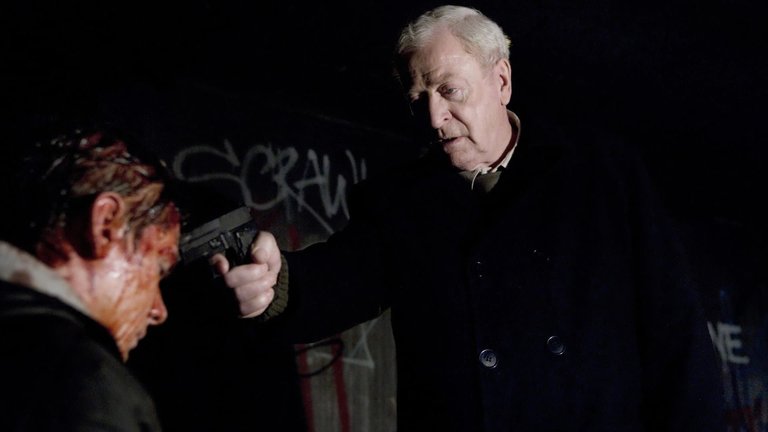
Certain films face significant challenges from their inception, often due to their tone and worldview being 180 degrees away from critics or even the filmmakers themselves. This discord can create a barrier that is difficult to overcome, requiring a unique talent to surmount. Daniel Barber thankfully had such talent in his 2009 directorial debut, Harry Brown, an old-school vigilante thriller that diverges sharply from the more sanitised and politically correct treatments of the subject, making it a rarity for contemporary British cinema.
The protagonist of Harry Brown, portrayed by Michael Caine, is an elderly former Royal Marine who has lived through the Troubles in Northern Ireland. Now, he seeks a quiet existence as a pensioner in a London council estate plagued by youth gangs involved in drugs and violence. His life is further complicated by the slow decline of his beloved wife, leaving him with only his friend Len Attwell (played by David Bradley) for companionship, with whom he shares a passion for chess. When Len is brutally murdered following an altercation with local thugs, Detective Inspector Alice Frampton (played by Emily Mortimer) investigates but finds herself thwarted by the suspects' adeptness at evading justice. This failure ignites a deep anger within Harry, who, after a chance encounter with a junkie during a nighttime walk, taps into his old military training to defend himself. This act of violence sparks an internal transformation; Harry resolves to seek vengeance for his friend and reclaim his neighbourhood, despite the risks to his own life and the potential for further bloodshed.
Produced by Matthew Vaughn—one of the most prominent British filmmakers of the 21st century—Harry Brown employs a premise that, while not particularly original, resonates deeply: an individual taking justice into their own hands when authorities fail to act. This narrative template recalls Death Wish, the controversial but popular 1974 thriller starring Charles Bronson. Gary Young’s script adeptly shifts this story from the decaying urban landscape of 1970s America to the equally troubled inner cities of modern Britain. Just as Death Wish was accused of fascism for its portrayal of vigilantism as a means of achieving justice, Harry Brown similarly invites criticism.
In contrast to Death Wish, however, Harry Brown feels refreshingly contemporary—not merely due to its setting but also because it addresses themes of ageing and loneliness through its protagonist. Young’s script imbues Harry’s dilemmas with greater relevance and credibility; he is not just a man seeking revenge but a soldier who has witnessed real violence. In one particularly poignant scene, he expresses disdain for the street thugs who terrorise innocents for the sake of drugs, money, sex and cheap thrills instead based on ideological conviction—unlike the sectarian militants he once faced in Northern Ireland. This allows audiences to empathise with Harry's plight more easily, as the film presents a more believable dichotomy between good and evil.
Daniel Barber directs Harry Brown with remarkable efficiency, utilising Martin Ruhe's cinematography to evoke an atmosphere steeped in bleakness and despair. The action sequences are well-executed and grounded in reality, which some critics initially dismissed as excessive violence—particularly during the climactic street riot that almost feels apocalyptic. However, two years after the film's release, real-life riots erupted across England, lending an eerie prescience to Barber’s depiction of urban unrest.
The film's elevation can largely be attributed to Michael Caine's performance in what many consider one of his finest roles. At 76 years old, Caine showcases an impressive range as he transitions from a quiet, timid pensioner into an avenging figure. His background as an action hero in the early part of a career adds depth to this character; Harry Brown can be interpreted as an aged reflection of Caine's iconic role in Get Carter. Caine’s ability to convey vulnerability while simultaneously embodying latent strength makes Harry’s transformation believable and compelling. Supporting Caine are several talented British actors, some of who would later become familiar faces thanks to Game of Thrones.
While some viewers may find the plot details too convenient and the treatment of vigilantism not "politically correct," Harry Brown is a surprisingly good film that stands out as one of the more recommendable works of British cinema from the past decade and a half. Its gritty portrayal of life on a council estate, combined with its powerful performances and efficient direction, make it a compelling and thought-provoking watch.
RATING: 7/10 (+++)
Blog in Croatian https://draxblog.com
Blog in English https://draxreview.wordpress.com/
InLeo blog https://inleo.io/@drax.leo
Hiveonboard: https://hiveonboard.com?ref=drax
Rising Star game: https://www.risingstargame.com?referrer=drax
1Inch: https://1inch.exchange/#/r/0x83823d8CCB74F828148258BB4457642124b1328e
BTC donations: 1EWxiMiP6iiG9rger3NuUSd6HByaxQWafG
ETH donations: 0xB305F144323b99e6f8b1d66f5D7DE78B498C32A7
BCH donations: qpvxw0jax79lhmvlgcldkzpqanf03r9cjv8y6gtmk9